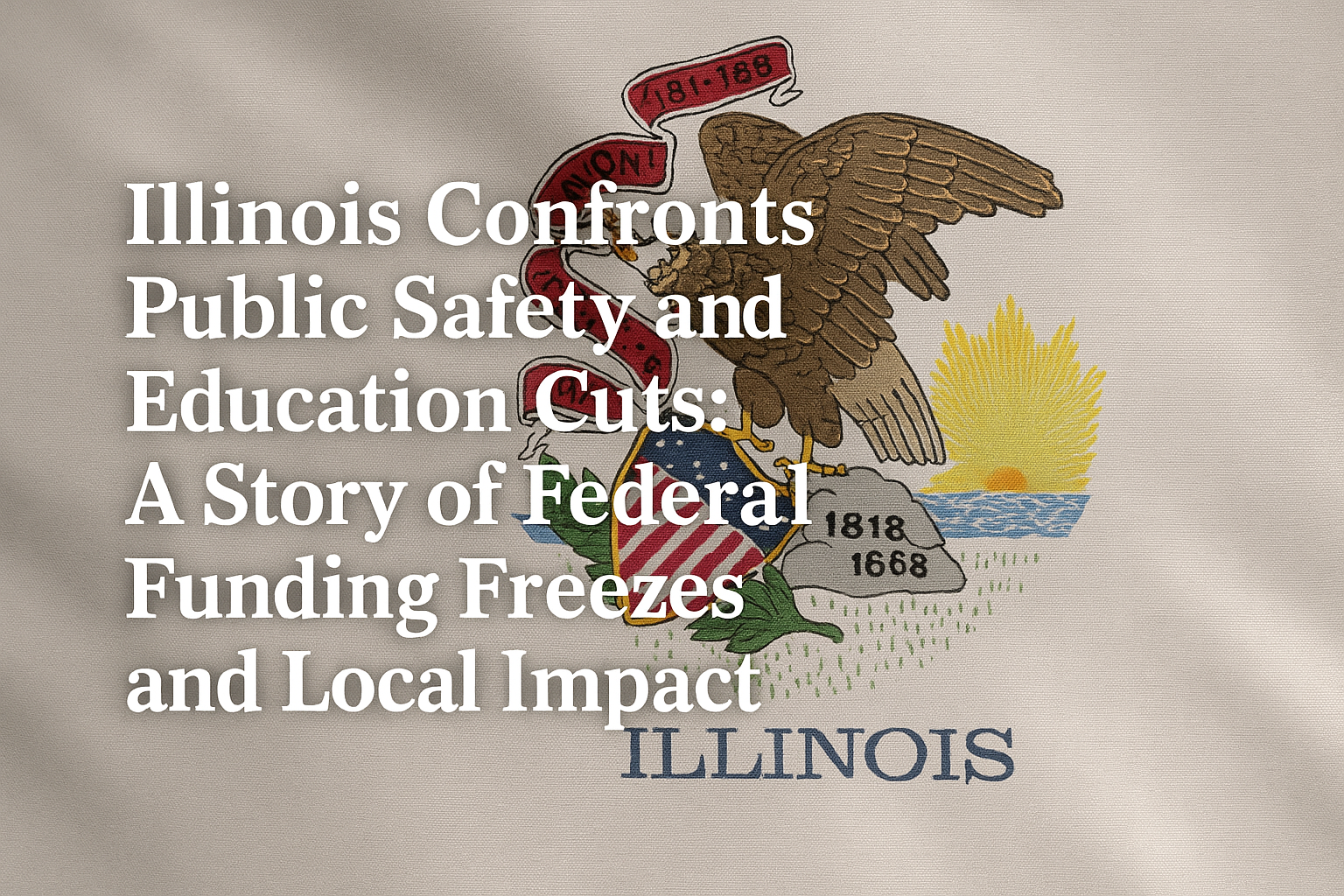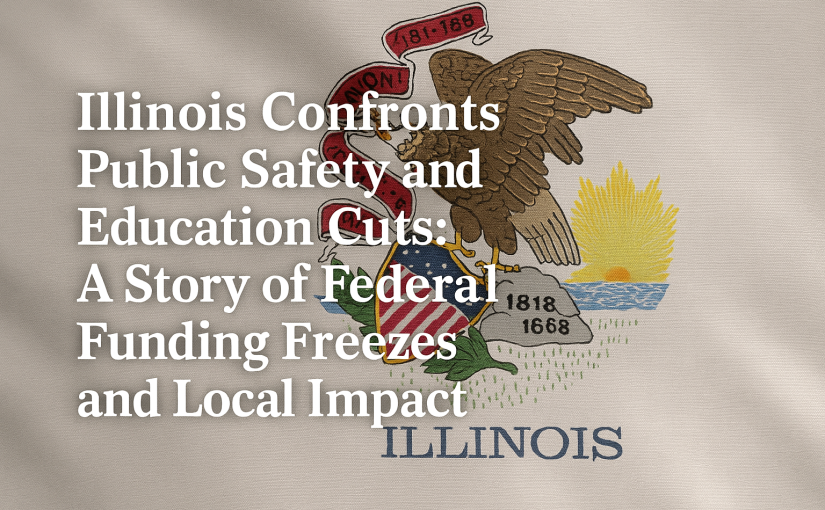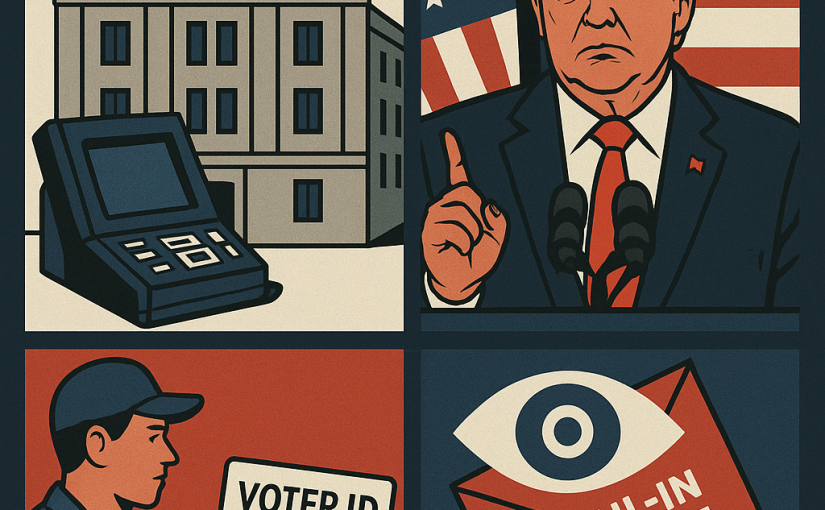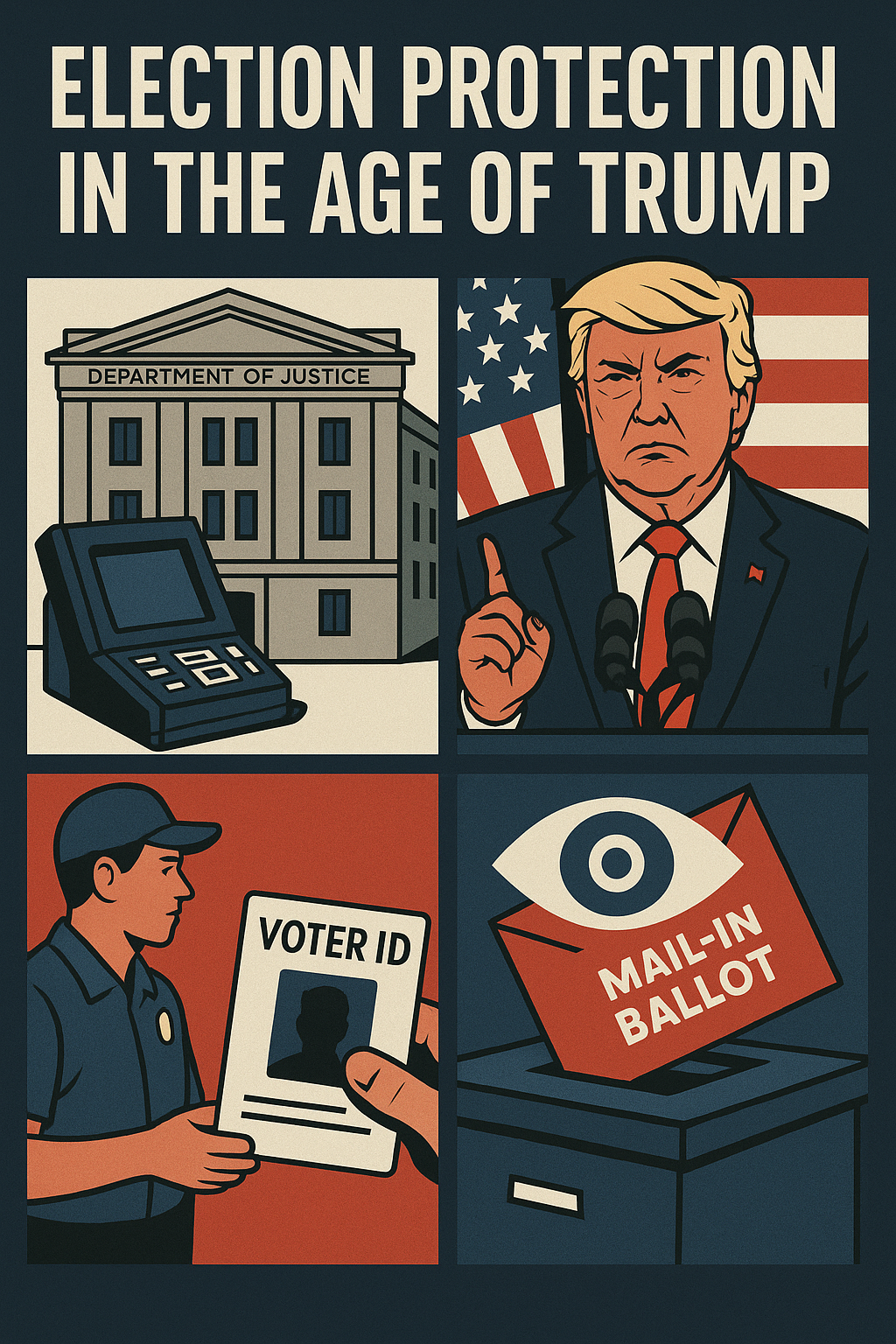
FEATURE
In early 2025, Illinois officials found themselves in a battle not only against crime, inequity, and public health challenges, but also against Washington. A series of funding freezes and abrupt grant cancellations from the Trump administration sent shockwaves through state agencies, school districts, health departments, and nonprofits.

For Governor J.B. Pritzker, Attorney General Kwame Raoul, and the leaders of Chicago and Cook County, the crisis was not theoretical. It was a scramble to keep frontline programs running while fighting in courtrooms to unlock money that had already been appropriated by Congress. What began as an obscure set of bureaucratic pauses quickly grew into a story about how much Illinois relies on federal funding — and how devastating it can be when that stream is interrupted.
A Freeze on Preparedness
The Illinois Emergency Management Agency (IEMA) depends on federal preparedness grants to keep SWAT teams trained, bomb squads equipped, hospitals ready for surges, and local emergency managers linked into a statewide system. When the Department of Homeland Security froze more than $200 million in these dollars, IEMA officials warned that readiness was being eroded.
Raoul sued to force the release, arguing that “life-threatening” harm would follow if communities lost the capacity to respond to disasters. For Illinois State Police and local agencies, the funding gap meant delaying equipment purchases and cutting back on joint exercises. Even after a court issued an injunction, the flow of money was uneven, leaving state planners frustrated.
Justice Department Pulls Grants
While IEMA fought for its dollars, the Department of Justice canceled hundreds of public safety grants nationwide, worth about $500 million. These grants underwrote victim services, rural policing, crime analysis, and gun violence prevention. Illinois agencies and nonprofits were among those left in limbo, scrambling to replace operating money that supported trauma centers, police overtime, and community violence-interruption programs.
For Chicago, the move felt all too familiar. Back in 2017, the city had to sue to prevent DOJ from conditioning its Byrne JAG policing grant — about $3.2 million — on immigration enforcement. Courts eventually sided with Chicago, ruling that the administration could not attach unrelated conditions. The 2025 cancellations revived those fears, raising questions about whether federal dollars for law enforcement were becoming political bargaining chips.
VOCA and the Fight Over Victim Services
One of the most contentious battles involved the Victims of Crime Act, or VOCA. Illinois normally receives about $54 million annually from the federal VOCA fund to support domestic violence shelters, rape crisis centers, legal aid groups, and counseling services. But the Justice Department tried to tie the money to immigration enforcement cooperation.
Raoul again went to court, warning that the new conditions would strip funding from groups that serve some of the most vulnerable people in the state. Chicago’s large network of victim service providers, from South Side shelters to downtown legal aid organizations, faced the prospect of losing millions overnight.
Education and Youth Programs in Limbo
The most visible freeze came in the summer of 2025, when the U.S. Department of Education halted $6.8 billion nationally across six long-standing programs. Illinois was owed about $219 million.
For Chicago Public Schools, which receives roughly $18.6 million in Title II-A (teacher development) and $20.3 million in Title IV-A (academic enrichment), the freeze came at a dangerous time. Federal revenue accounts for about 16 percent of the district’s budget — more than $1 billion a year. While the state and CPS leadership insisted programs would continue, the pause introduced uncertainty into hiring and planning cycles. Only after multistate litigation did the administration agree to release the full funding by early fall.
AmeriCorps, too, was nearly eliminated. Illinois stood to lose $12 million that supported community service placements in Chicago nonprofits — tutoring programs, food security efforts, and neighborhood safety initiatives. A judge ordered restoration of the grants, and Raoul joined other attorneys general in announcing victory at the end of August.
Public Health and Early Childhood Programs Disrupted
The Illinois Department of Public Health reported that $477 million in expected federal funding was blocked. Local health departments, including Cook County’s, suddenly lost access to dollars that underwrote infectious disease prevention, mental health outreach, and community health worker programs.
Meanwhile, the Department of Health and Human Services closed its Chicago Region V Head Start office on April 1. The office had served as the oversight hub for early childhood programs across six Midwestern states. With its closure, grantees were left confused about compliance reviews, grant renewals, and who to call when problems arose. Senators Dick Durbin and Tammy Duckworth pressed for answers, while the National Head Start Association warned that children and families were being placed at risk.
A Patchwork of Wins and Ongoing Fights
By late summer, Illinois had secured some victories. Courts forced the restoration of AmeriCorps dollars and education grants. FEMA preparedness funds began flowing again, albeit unevenly. But VOCA dollars and DOJ public safety grants remained tied up in legal disputes, and the long-term fate of early childhood oversight was unresolved.
The story that emerges is one of fragility. Illinois relies heavily on federal funding: for schools, for police and emergency response, for health care, and for nonprofits that knit together the safety net. When those streams are paused or politicized, the ripple effects are immediate. Teachers worry about training budgets. Shelters worry about keeping the lights on. Police departments weigh whether to cancel overtime or scale back neighborhood patrols.
For Illinois leaders, the message was clear. They would have to keep fighting in court — and in the public arena — to defend their access to dollars already promised by Congress. For communities across the state, from Chicago’s neighborhoods to downstate counties, the stakes were nothing less than safety, education, and the health of their residents.
Bibliography
- Illinois Attorney General, “Attorney General Raoul takes action to require Trump administration to release critical emergency funding,” Feb 28, 2025.
- https://illinoisattorneygeneral.gov/news/story/attorney-general-raoul-takes-action-to-require-trump-administration-to-release-critical-emergency-funding
- Illinois Emergency Management Agency, Homeland Security Grant Program.
- https://iemaohs.illinois.gov/hs/hsac/hsgp.html
- Illinois Emergency Management Agency, Grants Overview.
- https://iemaohs.illinois.gov/hs/hsac/grants.html
- Reuters, “U.S. Justice Department cancels hundreds of grants for police, crime victims,” Apr 23, 2025.
- https://www.reuters.com/world/us/us-justice-department-cancels-hundreds-grants-police-crime-victims-2025-04-23/
- NPR Illinois, “Justice Department cuts to public safety grants leave police and nonprofits scrambling,” May 24, 2025.
- https://www.nprillinois.org/2025-05-24/justice-department-cuts-to-public-safety-grants-leave-police-and-nonprofits-scrambling
- Council on Criminal Justice, “DOJ Funding Update: A Deeper Look at the Cuts,” 2025.
- https://counciloncj.org/doj-funding-update-a-deeper-look-at-the-cuts/
- Politico, “Cities sue DHS over frozen anti-terrorism funds,” Jun 17, 2025.
- https://www.politico.com/news/2025/06/17/cities-sue-dhs-over-frozen-anti-terrorism-funds-00411556
- Illinois Attorney General, “Attorney General Raoul co-leads lawsuit to block illegal conditions on VOCA grants,” Aug 18, 2025.
- https://illinoisattorneygeneral.gov/news/story/attorney-general-raoul-co-leads-lawsuit-to-block-illegal-conditions-on-victims-of-crime-act-grants
- Capitol News Illinois, “Raoul sues Trump administration for access to crime victim funding,” Aug 18, 2025.
- https://capitolnewsillinois.com/news/raoul-sues-trump-administration-for-access-to-crime-victim-funding
- Associated Press, “20 states and D.C. sue DOJ to stop immigration requirements on victim funds,” Aug 2025.
- https://apnews.com/article/immigration-crime-victims-compensation-lawsuit-20-states-8cf1553b93bcdbb7931d6cba28011386
- Reuters, “U.S. government withholding over $6 billion in school funding, research group says,” Jul 2, 2025.
- https://www.reuters.com/world/us/us-government-withholding-over-6-billion-school-funding-research-group-says-2025-07-02/
- Reuters, “U.S. to release over $1 billion in after-school funding it withheld, official says,” Jul 18, 2025.
- https://www.reuters.com/legal/government/us-release-over-1-billion-after-school-funding-that-it-withheld-official-says-2025-07-18/
- Associated Press, “U.S. Department of Education to release $1.3 billion in after-school funding,” Jul 18, 2025.
- https://apnews.com/article/us-department-of-education-funding-freeze-2025-07-18-211451212c377321fad4c751da3eb9df
- Illinois Attorney General, “Attorney General Raoul secures full relief for Illinois schools,” Aug 27, 2025.
- https://illinoisattorneygeneral.gov/news/story/attorney-general-raoul-secures-full-relief-for-illinois-schools-in-lawsuit-challenging-withholding-of-educational-funding-8-27-25
- Illinois State Board of Education, “FY24 Final Title I, II-A, and IV Allocations.”
- https://www.isbe.net/Documents/FY24-Final-Title-I-IIA-IV-Allocations.pdf
- Civic Federation, Financial Landscape Analysis Report of CPS FY2025, Jan 2025.
- https://civicfed.org/sites/default/files/2025-01/Civic%20Federation%20-%20Financial%20Landscape%20Analysis%20Report%20of%20CPS%20FY2025%20FINAL.pdf
- WTTW, “Illinois, Cook County public health officials say federal funding cuts came with little notice,” Mar 31, 2025.
- https://news.wttw.com/2025/03/31/illinois-cook-county-public-health-officials-say-federal-funding-cuts-came-little-notice
- National Head Start Association, “NHSA expresses deep concern over administration shuttering regional offices,” Apr 1, 2025.
- https://nhsa.org/press_release/nhsa-expresses-deep-concern-over-administration-shuttering-regional-offices/
- Center for American Progress, “Closures of Head Start regional offices jeopardize critical services,” Apr 2025.
- https://www.americanprogress.org/article/closures-of-head-start-regional-offices-jeopardize-critical-services-for-children-and-families/
- Chalkbeat Chicago, “Illinois lawmakers ask questions about HHS closing Head Start offices,” Apr 9, 2025.
- https://www.chalkbeat.org/chicago/2025/04/09/illinois-federal-lawmakers-ask-questions-about-hhs-closing-head-start-offices
- Chicago Sun-Times, “Trump AmeriCorps cuts include grant terminations for $12 million in Illinois programs,” Apr 30, 2025.
- https://chicago.suntimes.com/2025/04/30/trump-americorps-cuts-include-grant-terminations-for-12-million-in-illinois-programs
- Reuters, “Trump administration must restore AmeriCorps programs in 24 states, judge rules,” Jun 5, 2025.
- https://www.reuters.com/world/us/trump-administration-must-restore-americorps-programs-24-states-judge-rules-2025-06-05/
- Illinois Attorney General, “Attorney General Raoul prevents $184 million cut to AmeriCorps service programs,” Aug 29, 2025.
- https://illinoisattorneygeneral.gov/news/story/attorney-general-raoul-prevents-184-million-cut-to-americorps-service-programs
- Chicago Sun-Times, “Facing lawsuit, administration restores $12 million in Illinois AmeriCorps funds,” Aug 29, 2025.
- https://chicago.suntimes.com/donald-trump/2025/08/29/facing-lawsuit-trump-administration-restores-12-million-in-illinois-americorps-funds
- NBC Chicago, “Chicago to sue Justice Department over sanctuary city funding cuts,” Aug 4, 2017.
- https://www.nbcchicago.com/news/national-international/chicago-to-sue-justice-department-over-sanctuary-city-funding-cuts/21256/
- Ballotpedia, “JAG grant lawsuits against the federal government (2017–2018).”
- https://ballotpedia.org/JAG_grant_lawsuits_against_the_federal_government_%282017-2018%29
- City of Chicago, “Legal victory in Trump Justice public safety funding case,” Nov 21, 2017.
- https://www.chicago.gov/city/en/depts/mayor/press_room/press_releases/2017/november/LegalVictoryTrumpJusticePublicSafetyFunding.html
- WTTW, Byrne JAG complaint PDF (2017).
- https://news.wttw.com/sites/default/files/article/file-attachments/Bryne%20JAG%20Complaint%20%281%29.pdf


